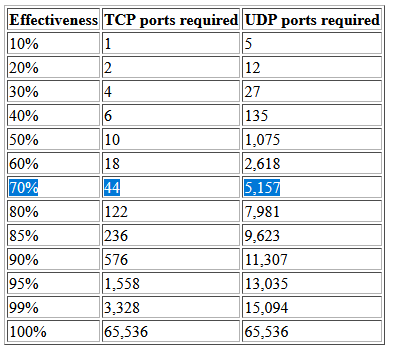Port Scanner - Find open ports on a computer
This free online tool lets you instantly check for open ports on any server/computer connected to the Internet. The information about what ports are open or closed on a particular system can be useful to many types of people. Network administrators would use this to analyze the security of their network, for example, to check which ports should be closed to provide most security. This information can also be used to quickly troubleshoot if your server applications are reachable from outside your local network and if the firewall you have in place is too strict in that aspect. Port scanning is also used by hackers to find out what services are running on that computer, and to then see if any of them can be exploited in order to gain access to that system/network. And finally, port scanning is very often also used by casual computer users who simply want to check if port forwarding was setup correctly on their router, and that the service that they are trying to host on their home computer is accessible from the outside.
Notice: By using this tool, you implicitly agree that you are authorized to initiate this port scan against your target computer. Read the complete terms of service below.
| Port | State | Service |
|---|---|---|
| ${ entry.port } |
 Open
Open
 Closed/Filtered
Closed/Filtered
|
${ entry.service } |
|
Scanning...
Nothing here yet.
|
||
Permalink:
Terms of Service
While the practice of port scanning is technically NOT illegal, some networks will not like it, and may decide to file an abuse report to your ISP or whatever service provider you used to do the scanning. This is the major reason why we don't let anyone blindly scan too many computers at once, and why we will blacklist anyone who abuses this free service. General rules are as follows:
- You will be using this service for your own personal use only.
- Do not scan computers or servers that do not belong to you.
- You may only scan the computers which you are authorized to scan, such as your own personal computer to test your router settings, or cloud servers which you control.
- We are not responsible for people who abuse this service in any way.
You also consent to the results of your scan to be saved in our database. This is to allow of sharing of your port scan results with anyone else on the Internet.
How do I scan for ALL open ports at once?
At this point, our port scanner limits to 100 ports per scan. That limit may change in the future, but there is just no way around this for now.
Scanning all 65,535 potential ports - 100 at a time is unreasonable, but you shouldn't need to scan them ALL because it is not only inefficient, it is also unnecessary. For maximum effectiveness, you should limit your scanning to only those ports that are known to be assigned to well known services. Creators behind Nmap did some research here, and found that scanning only a 1,000 ports (less than 2% of all available), is enough to find 90% of open ports on any computer. Scanning only 100 gets you almost 80%, and fast!

Source: https://nmap.org/book/performance-port-selection.html
How do I scan a range of IP addresses for open ports at once?
Such feature is not yet supported at the moment! For now, you are allowed to scan ONE target for between one to 100 ports per scan. For any sort of "mass scan", you will need to use your own computer.
Top X ports scanned by Nmap
When you select to scan 100 most common ports, or use –top-ports
option with Nmap - what ports are actually being scanned?
Since this tool is based on Nmap, that list of ports scanned sorted by their popularity can be found here:
https://raw.githubusercontent.com/nmap/nmap/master/nmap-services
Sorted versions of that text file below:
cat /usr/share/nmap/nmap-services | grep '/tcp' | sort -r -k3 | awk -F'\t' '{printf "%-20s %-15s %s\n", $1, $2, $4}' | head -n 1000
cat /usr/share/nmap/nmap-services | grep '/udp' | sort -r -k3 | awk -F'\t' '{printf "%-20s %-15s %s\n", $1, $2, $4}' | head -n 1000

 United States (838)
United States (838) Convert any tweet to static image
Convert any tweet to static image
 Send email to anyone anonymously
Send email to anyone anonymously
 Check Alexa Rank for sites
Check Alexa Rank for sites